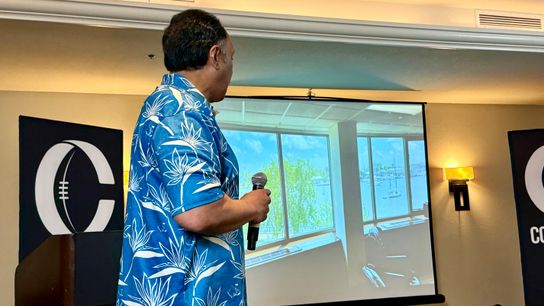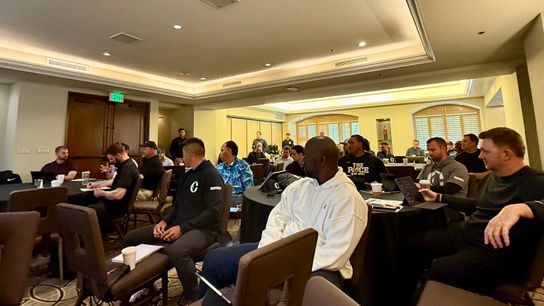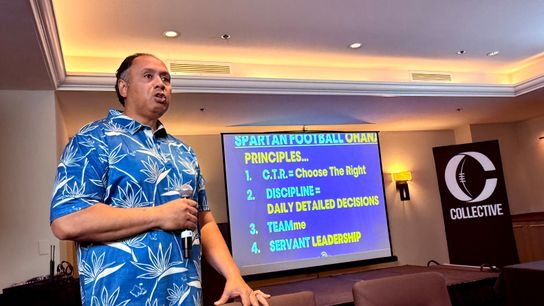
WESTLAKE VILLAGE, Calif. – Ken Niumatalolo is showing a room full of coaches – NFL, college, some select high school leaders – a picture so pristine it could double as a postcard here in this swanky Los Angeles-area enclave, a few miles from the beaches of Malibu and 40 from the fabled Rose Bowl.
On the screen is a harbor full of sailboats and other vessels, seen through the glass of Niumatalolo’s old office in Annapolis, Maryland, as head coach at Navy.
A winner of 116 games as a college head coach, seven of them last year during a breakthrough-campaign atop the San Jose State program, Niumatalolo is at ease in a room with NFL general managers, some 30 NFL assistant coaches and nearly as many college coaches, ranging from heads of programs to position coaches.
Delivering the keynote address at The Collective Invitational 2025, Niumatalolo commands the room without raising his voice or using any gimmicks; he’s speaking from the heart about football, family and leadership.
Which is why he knows, despite the view through that windowpane, not everyone is going to see the same image.
“My way isn’t the right way, and it doesn’t mean my way is better; it’s just the way I see things,” Niumatalolo tells the coaches. “Maybe you come and see the same view, if you want, to look at the beautiful trees and say this is a great view.
“And then if you lost a game the night before, you might have that same view and say, ‘Stupid birds, they pooped on my windows.’”
Soon, Niumatalolo is pulling the crowd closer to his message, weaving them into the topic, by showing a photo from his own hometown, the beaches of Laie, Hawaii, and acknowledging what everyone in the room lives at some point in coaching.
“This is a hard profession, it’s hard to keep your job,” he says. “Don’t forget where you’re from.”
Recounting his own firing as Navy’s offensive coordinator after the 1998 season and going to work for John Robinson at UNLV, Niumatalolo delves into the leadership lessons he carries with him more than a quarter-century later, as well as those he still models from former national championship-winning Alabama icon Gene Stallings.
Known for his humility, Niumatalolo shares that he does have one coaching trophy on display in his home: the Stallings Award.
“When I think about Gene Stallings, a guy who coached at the highest level, national championship coach, coached in the (NFL), and these are just my thoughts on leadership; I definitely don’t have any degree in leadership, never taken any classes on it,” says Niumatalolo, noting his two sons now are in college coaching and spotlighting his daughter, a former Maryland lacrosse player. “The most amazing thing to me is how he led his family. Coach Stallings’ son (Johnny) passed away in 2008.
“I didn’t know much, but I was fortunate in 2019, I won the Gene Stallings Award. I just love the trophy. I love the trophy of a coach and his son. It’s so powerful, the symbolism so powerful. Just love to see that here’s a coach who won at the highest level, but his greatest leadership was in his own home with his own kids.”
These moments from Niumatalolo illuminate his presence at this event, with host and founder Richmond Flowers II delivering to the crowd exactly why Niumatalolo is featured.
“Who can maximize what you’ve got and do more with less?,” Flowers, a former NFL wideout now among the sport’s representative hierarchy, asks in revealing a glimpse of his own leadership evaluative process. “He exceeded expectations; that’s what Ken has done.
“Looking at what he’s done and who he is as a person, his attention to detail on and off the field, the passion for being a person to look to as a picture of consistency.”
Flowers points to one of those individuals in the room.
“Bryce (McDonald), the way you’ve changed his life and impacted it is why we do it,” Flowers adds.
A three-year letterwinner for Niumatalolo at Navy in the early 2000s, McDonald also a Purple Heart recipient from his time serving in the United States Marine Corps in Iraq and also a former top-tier college football front office executive.

John Brice/FootballScoop
A packed house inside the Hyatt Westlake for the invitation-only Collective Invitational hears Ken Niumatalolo's keynote address.
Niumatalolo, selfless in his own leadership and quick to spotlight his parents as shining examples of leadership, challenges the crowd to be a lighthouse; to not only be a guiding light in calm waters but one who helps those around him navigate the tempest.
Mike Willis, among college football’s youngest head coaches, hears the message and begins making immediate plans for his own Marist football program.
“I love a good metaphor, something that can really strike you visually and resonate with your team and staff, and Coach Niumatalolo’s presentation had a lot of powerful imagery,” Willis tells FootballScoop. “But being a lighthouse and the idea of being an institution, a person who others can look to in times of great calm but also when the sea is churning and the water is dangerous, the lighthouse continues to do its job.
“That deeply resonated with me, and it’s something Marist football will be borrowing from Ken Niumatalolo.”
Niumatalolo openly shares two other bedrock tenets in his program: the Spartan Football Ohana to L.E.A.D. and CTR (Choose The Right), even recalling how that dedication to accountability throughout his program likely led to a loss to archrival Army:
L – Love. "What do your players see? If it doesn’t start with love, it’s not true leadership and won’t sustain itself."
E – Example. "My father was a cook in the coast guard. I’m 60 now. Here I was a young man, I never did see dad in an office [when he owned his own restaurant], he was always down in the kitchen, cooking with the cooks. I knew where to find him."
A – Accountability. "In today’s day and age, revenue sharing, NIL and a lot of things transpiring, I don’t think we can ever get away from that. It doesn’t matter how much you pay guys."
D – Develop. "It’s hard. It’s hard at all levels. High school, college, pros, it’s hard, but it’s what we do.”
While there are several programs throughout college football who focus on having their seniors or captains or perhaps offensive and defensive linemen sit in the first-class section of flights, Niumatalolo implores his staff to double as valets.
“I’ve always done this, and the guys don’t know what we’re trying to do, but anytime we go on an away trip, we carry their bags to the bus,” Niumatalolo says of his program’s road-trip protocol. “They have no idea why we do it. We want guys to get your food, get on the bus, relax. It’s just a way for me to want to show players that we are willing to serve them. That they are not above us.
“Here’s something to me, in my lifetime probably among the greatest compliments that I’ve gotten, I’m sitting up front in Bus 1 right next to the bus driver, and he goes, ‘Coach, I’ve driven a lot of teams. I’ve never seen coaches carry their players’ bags. Never.” To me, that’s been some of the biggest compliments because that’s what I want to portray from a leadership standpoint. Yes, I want to win games but those are the kinds of things that I’m trying to get from our team, servant leadership. But it’s not what you talk about, it’s the way you live."
It's a postcard-view out an office window. What do you see?
